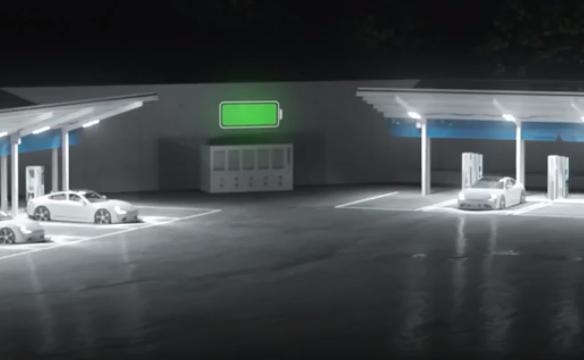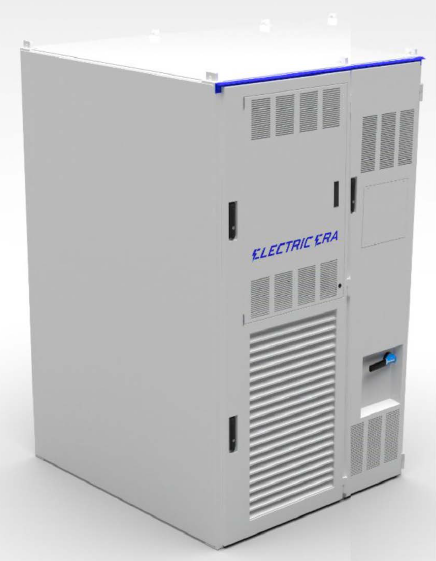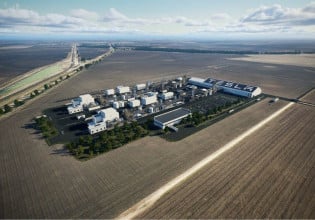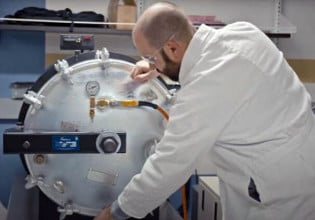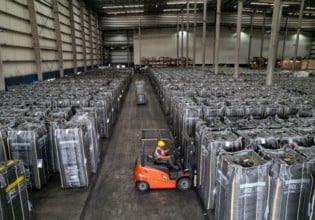Startup Receives Funding for EV Fast-charging Storage Solution
Electric Era, a Seattle, Washington-based startup, has received $4 million in funding for its PowerNode smart electric vehicle fast-charge energy storage solution.
Electric vehicle (EV) charging continues to be a hot area of for early-stage private investment. In line with this trend, Seattle, Washington-based startup Electric Era has secured $4 million in seed funding for development of its PoweNode high-power storage solution for fast-charging station operators.
Fast-charging station with PowerNode. Image used courtesy of Electric Era
According to Electric Era, transportation electrification is anticipated to add more than 60 terawatt-hours (TWh) of annual electricity demand and 10 to 20 gigawatts (GW) of peak load in the United States alone. By managing charge station operations based on utilization and utility tariffs, PowerNode allows station operators to provide EV charging services at more competitive rates while improving profitability.
PowerNode Aids Load Balancing, Pricing Arbitrage
Using an artificial intelligence (AI) engine and proprietary algorithms, PowerNode monitors utility rates and load trends to optimize charging costs by purchasing and storing lower-cost electricity during off-peak hours. This electricity can then be used for vehicle charging during periods of peak demand when utility rates are higher.
For example, PowerNode could store energy from the grid overnight at lower rates and then use this cheaper electricity for vehicle charging during the high-demand morning or evening commutes the next day. Also, as a flexible storage solution, PowerNode reduces the amount of infrastructure needed to meet projected peak demand, reducing investment requirements, asset depreciation, and other associated costs.
Electric Era is the latest of several companies looking to use energy storage, in tandem with sophisticated AI algorithms, to execute this type of time-based, electricity pricing arbitrage. Besides cheaper electricity and more profitable operations, the resulting load balancing also can help improve the efficiency and performance of the power grid.
PowerNode can reduce infrastructure and peak demand costs. Image used courtesy of Electric Era
PowerNode connects to 480-volt AC, three-phase, 60-hertz grid power and can store 59 kilowatt-hours of usable energy. The continuous discharge power rating is 120 kilowatts at 480 V with a maximum AC output current of 165 amperes. The PowerNode stands 7.9 feet high with a footprint of 4.9 x 5.6 feet and can scale as needed to the power requirements for fast-charging applications.
PowerNode high-power storage for fast charging. Image used courtesy of Electric Era
Federal Legislation Drives EV Charging Investment
Two recent pieces of federal legislation that are likely having an impact on interest and investment in the EV charging space are the Infrastructure Investment and Jobs Act (IIJA) and the Inflation Reduction Act (IRA). Combined, the two pieces of legislation allocate nearly $700 billion in spending for transportation, or transportation-related investments in the United States. The IIJA specifically earmarks $7.5 billion in investment for EV charging infrastructure.
Backed by these government commitments, private investment in EV charging should continue to be strong for venture-backed early-stage startups to legacy Fortune 500 companies.
Along with federal spending, the White House recently announced more than $700 million in private commitments to make EV charging more affordable and accessible, with the goal of building capacity to roll out 250,000 charging stations per year.
Specific investments from the private sector include a $450 million investment from Siemens and Volkswagen into Electrify America, a leading network of fast chargers. The investment will support the rapid deployment of 10,000 ultra-fast chargers at 1,800 charging stations. Siemens is also committing to build one million charging stations over the next four years by investing $250 million in the United States, including expansion of existing manufacturing facilities in Grand Prairie, Texas, and Pomona, California.
Chargepoint, a Campbell, California-based public company that has been delivering EV charging solutions to the market since 2007, is expanding a partnership with SMTC Corporation to expand its DC fast-charging production and establish a new manufacturing line for Level 2 chargers at its Milpitas, California, facility. The additional investment will allow the facility to produce 10,000 DC fast chargers and 10,000 Level 2 chargers by 2026.
Strong Q3 for EV Charging Initiatives and Developments
Funding, product, and other business development activities surrounding EV charging and associated products and services were robust in third quarter 2022. Here is a summary of some of these developments as reported by EE Power:
-
A-1 Alternative Fuel Systems joined United Kingdom-based company L-Charge to provide emergency mobile charging to EV drivers in California.
-
California-based companies ev.energy and Smartenit launched a smart electric vehicle charging cable geared toward residential consumers who live in apartment buildings and condominiums.
-
TeraWatt announced that it has raised $1 billion in funding to develop a nationwide charging network for commercial vehicles.
-
Moxa launched the ICF-11711 series of CAN-to-fiber converters to help extend communication distances for EV charging station operations.
-
Wallbox, an EV charging solution provider announced the acquisition of COIL, Inc., an installer of EV charging solutions for the U.S. market.
We anticipate the pace of EV charging investment, product, and business development initiatives to quicken in the 2022 fourth quarter and beyond.


